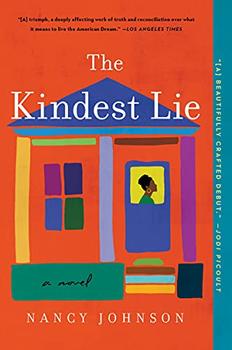Book Club Discussion Questions
In a book club? Subscribe to our Book Club Newsletter and get our best book club books of 2025!
For supplemental discussion material see our Beyond the Book article, Talking About Race Matters and our BookBrowse Review of The Kindest Lie.
Please be aware that this discussion guide will contain spoilers!
- The novel begins in 2008 with the election of Barack Obama. Why does Johnson choose
to open the story at this pivotal moment in history and how does that set the tone for
what unfolds in the book? How different would this story be if it began in the present
day?
- Ruth's long-held secret from her past sends her back to her impoverished hometown
and threatens to upend the upscale life she's created with her husband Xavier. What
does this reveal about being Black in America? What is the cost of that double-identity?
Does one ultimately have to choose?
- When Ruth encounters Black panhandlers in downtown Chicago, she refrains from
giving them money; however, she donates to a white family she's never met that lost a
child in a Ganton house fire. Later in the novel, she locks her car doors when she sees
Black guys jostling in the street. Ultimately, she befriends Midnight, who is white. Does
Ruth suffer from internal racial bias or selective classism?
- Ruth wrestles with the moments after she gives birth when Mama leaves the bedroom
with her baby, telling her not to think about her son and instead pursue her Ivy League
education. Is Ruth to blame for walking away from her child? What was her
responsibility, if any, to pursue the truth about her son's identity and whereabouts over
the years? Did she have a choice or was she robbed of it?
- The threat of police violence is a constant throughout the novel. How does that impact
Black and white characters differently?
- Butch is portrayed as a racist who makes hateful remarks and projects a bitter
worldview. Despite this negativity, does he have any redeeming qualities? How does
Midnight's attachment to his father inform his own understanding of race?
- Midnight got his nickname from his Black and brown friends from school because he
was a little white boy trying to 'act Black.' Is Midnight guilty of cultural appropriation? Do
you think his behavior could be interpreted as offensive?
- When the boys have the run-in with Dale at the convenience store, Corey and Midnight
process that encounter very differently. How do their racial identities shape their
reactions?
- Mama reveals many explosive secrets throughout the novel. Are the choices she makes
to protect Ruth and Eli understandable and forgivable?
- The Kindest Lie examines the sacrifices and complexities of motherhood. What do Ruth,
Mama, Lena, Verna, and Natasha reveal about what it means to be a mother in
contemporary America?
- Eli and Butch are both victims of the economic downturn. How does toxic masculinity
infect Black and white men under this type of pressure?
- Midnight is trapped in the web of poverty that Ruth managed to escape. Yet he's white
and she believes he will always benefit from that privilege in spite of his unstable home
life. Is that true? Will his whiteness supersede his economic disadvantage? Corey is
raised in a middle class, two-parent household, but he's still Black. What will his future
look like? How do these dynamics impact the trajectory of these characters' lives and
how they view each other over the course of the novel?
Unless otherwise stated, this discussion guide is reprinted with the permission of William Morrow Paperbacks.
Any page references refer to a USA edition of the book, usually the trade paperback version, and may vary in other editions.
